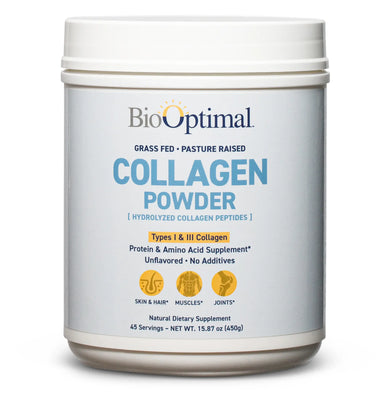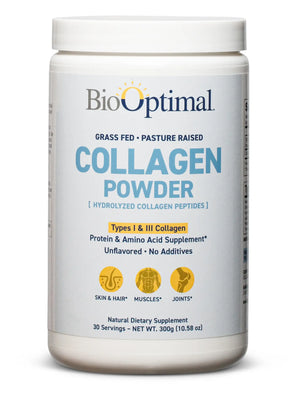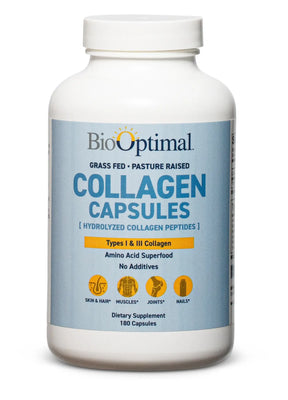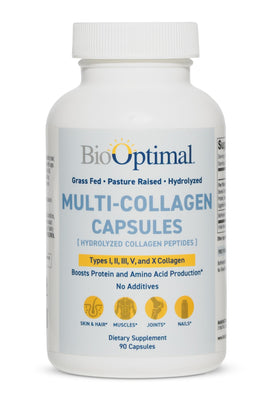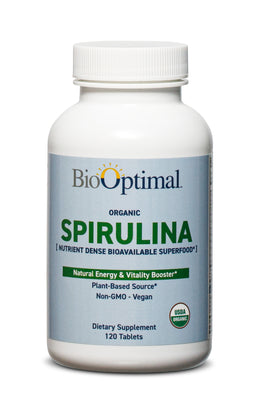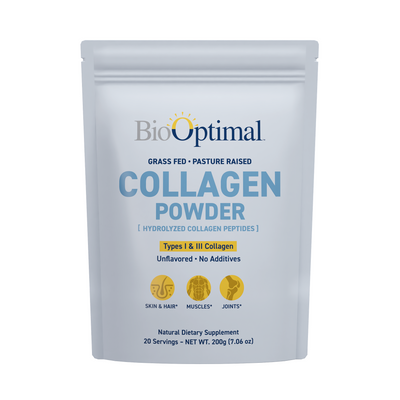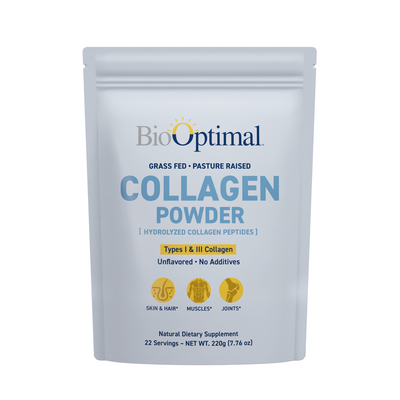Table of contents:
- Why does Collagen Powder Often Have Heavy Metal Content?
- Why Choose The Best Collagen Powder Without Heavy Metals?
- What Heavy Metals Are Found In Collagen Powder?
- How To Choose The Best Collagen Powder Without Heavy Metals?
- What Side Effects Happen From Heavy Metal Content In Collagen Supplements?
- How Are Collagen Supplements Refined To Remove Heavy Metals?
- Wrapping Up
Choosing a high-quality collagen powder is essential for supporting your skin, joints, and overall wellness. However, all collagen products are different, and concerns about heavy metal contamination make it even more important to select a safe and trustworthy option. Choosing the best collagen powder without heavy metals, such as lead, arsenic, and mercury, is crucial to avoid any kind of health complications caused by such impurities.
In this guide, you’ll learn how to identify collagen powders free from harmful contaminants and ensure your chosen product is safe, effective, and aligned with your health goals. We’ll learn about the importance of third-party testing, clean sourcing practices, and other factors to consider when evaluating a product’s safety. Select a collagen supplement that fits your needs without compromising your well-being.
Why does Collagen Powder Often Have Heavy Metal Content?
Due to the sourcing and processing of its raw materials, collagen powder can sometimes contain heavy metals. Contaminants like lead, arsenic, or mercury an enter the product if collagen is derived from poorly monitored animal or marine sources. Understanding these risks is crucial when searching for the best collagen powder without heavy metals.
The presence of heavy metals often stems from environmental pollution. Animals and fish, commonly used to make collagen, can accumulate toxins through their diet or habitat. Collagen may retain these harmful substances if not sourced from clean, controlled environments. Additionally, inadequate testing or lax quality control during manufacturing can fail to detect or eliminate contamination.
To ensure safety, choose collagen powders verified by third-party testing. Look for brands that source collagen from well-maintained, toxin-free environments and prioritize rigorous quality assurance to provide a safe, clean product for your health.
Why Choose The Best Collagen Powder Without Heavy Metals?
Choosing the best collagen powder without heavy metals is essential for protecting your health and maximizing the benefits of this popular supplement. Heavy metals like arsenic, lead, and mercury can harm your body, even in small amounts. Opting for a collagen powder that prioritizes purity ensures you get the nutrients you need without exposing yourself to harmful contaminants.
Protect Your Health from Toxicity
Heavy metals are linked to severe health issues, including kidney damage, neurological disorders, and weakened immunity. Prolonged exposure can also impact gut health and cause inflammation. Choosing a high-quality collagen powder free from heavy metals reduces these risks, allowing you to focus on improving your skin, joints, and hair without compromising your safety.
Maximize the Benefits of Collagen
Collagen supports healthy skin, strong joints, and improved digestion. However, heavy metals in contaminated powders may hinder these benefits by burdening your body with toxins. The best collagen powder without heavy metals ensures your supplement is safe and effective, helping you achieve your wellness goals.
Prioritize Safety with Trusted Brands
Reputable brands take extra steps to guarantee their products meet stringent safety standards. Look for collagen powders that undergo third-party testing to verify the absence of heavy metals. Transparency in sourcing and manufacturing processes is also crucial to finding a product you can trust.
Choosing a safe, high-quality collagen powder allows you to enjoy its benefits while protecting your long-term health.
What Heavy Metals Are Found In Collagen Powder?
Due to environmental contamination and poor manufacturing practices, heavy metals like arsenic, lead, mercury, and cadmium are sometimes found in collagen powders. These pose significant health risks, so it is vital to select a product tested for purity and safety.
Lead, a common contaminant, is often linked to agricultural soil or water pollution. Even little lead accumulation in the body can cause developmental, neurological, and cardiovascular problems over time. Mercury is another heavy metal that may contaminate marine-based collagen powders, as fish and marine life often absorb mercury from polluted waters.
Arsenic, often present in groundwater, can infiltrate animal or marine sources that produce collagen. Long-term arsenic exposure causes skin conditions and cancer risks. Cadmium, another potential contaminant, is known for its harmful effects on the kidneys and bones.
To avoid these risks, choose the best collagen powder without heavy metals, verified through third-party testing.
How To Choose The Best Collagen Powder Without Heavy Metals?
Choosing the best collagen powder without heavy metals requires careful evaluation of sourcing, testing, and manufacturing practices. By focusing on transparency and quality, you can ensure the supplement is safe and effective. Here’s what to look for:
Prioritize Third-Party Testing
Third-party testing is critical to ensure the collagen powder is free from harmful contaminants. These independent evaluations verify that the product meets safety standards for heavy metals like lead, mercury, and arsenic. Always look for a certificate of analysis (COA) from a reputable lab.
Look for Transparent Sourcing
High-quality collagen comes from clean, well-maintained sources. For bovine collagen, choose products sourced from grass-fed, pasture-raised animals. Look for marine collagen derived from wild-caught fish from unpolluted waters. Transparency in sourcing ensures that raw materials are less likely to contain toxins.
Check the Brand’s Reputation
Brands prioritizing safety and purity often invest in rigorous quality control: research customer reviews, certifications, and the company’s commitment to clean practices. Trusted brands will openly share information about their testing and production processes.
Avoid Artificial Additives
Some collagen powders include unnecessary fillers or artificial ingredients that may mask heavy metal contamination. For better safety, choose products with minimal, natural ingredients.
What Side Effects Happen From Heavy Metal Content In Collagen Supplements?
Heavy metal contamination in collagen supplements can lead to various side effects, affecting multiple body parts. Prolonged exposure to heavy metals can cause toxicity, disrupting vital bodily functions and posing severe health risks. Choosing the best collagen powder without heavy metals is essential to avoid these dangers.
Potential Side Effects Include:
Neurological Issues- Lead and mercury contain neurotoxins that can impair brain function. Symptoms may include headaches, memory problems, or difficulty concentrating. Prolonged exposure can lead to more severe cognitive and developmental issues.
Kidney Damage- Cadmium and mercury are harmful to kidney function, potentially causing kidney disease or failure over time with consistent exposure.
Bone Weakness- Heavy metals like cadmium reduce calcium absorption, causing weaker bones and an increased risk of fractures.
Digestive Problems- Arsenic exposure may cause abdominal pain, nausea, or diarrhea, affecting overall gut health.
Cardiovascular Risks- Heavy metals can contribute to high blood pressure, anemia, and other cardiovascular problems.
Immune System Suppression- Chronic exposure to toxins compromises the immune system, making you susceptible to infections and illnesses.
How Are Collagen Supplements Refined To Remove Heavy Metals?
Collagen supplements undergo several refinement processes to minimize heavy metal content. Filtration and purification techniques, such as molecular distillation and activated carbon filtration, are commonly used to remove impurities. Manufacturers may also use enzymatic hydrolysis to break down collagen into peptides while discarding contaminants.
Sourcing from clean environments and testing raw materials for heavy metals further reduces the risk of contamination. Third-party lab testing is critical to ensure final products meet safety standards. These measures make the collagen supplement as pure as possible, aligning with safety requirements and protecting consumers from harmful toxins.
Does the Process Affect the Quality of the Supplements?
Proper refining methods do not compromise the quality of collagen supplements. Advanced technologies are designed to preserve the bioactive properties of collagen peptides while eliminating contaminants. For example, hydrolysis improves collagen's absorption in the body without altering its effectiveness. However, over-processing or poor refinement techniques can degrade the product’s amino acid profile, reducing its benefits. Reputable brands carefully balance purification with maintaining collagen’s structural integrity. By choosing the best collagen powder without heavy metals, you can enjoy a safe and effective supplement providing full health benefits without unnecessary risks.
Wrapping Up
Selecting the best collagen powder without heavy metals is crucial for protecting your health and maximizing the benefits of collagen supplements. You can confidently choose a safe, effective product using third-party testing, transparent sourcing, and quality manufacturing practices. Prioritizing purity ensures you enjoy collagen’s benefits—like improved skin, joint, and gut health—without unnecessary risks.
At BioOptimal, we’re committed to providing high-quality collagen supplements you can trust. Our products get tested to ensure safety and purity. Invest in premium collagen powders and take the first step toward healthier living.
FAQ
What is the safest collagen to take?
The safest collagen comes from clean, well-sourced materials like grass-fed bovine or wild-caught marine collagen and is verified by third-party testing for heavy metals.
Who should avoid collagen powder?
Individuals with allergies to the source (e.g., fish or bovine) or those with specific dietary restrictions should avoid collagen powder unless advised by a healthcare provider.
What metals are found in collagen supplements?
Due to environmental contamination, some collagen supplements have elements like arsenic, lead, mercury, and cadmium.
Do collagen capsules also have heavy metals?
Yes, collagen capsules can also contain heavy metals if the raw materials are contaminated or the product lacks proper safety testing.


